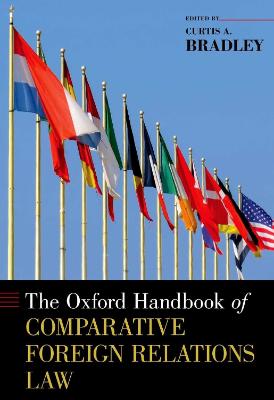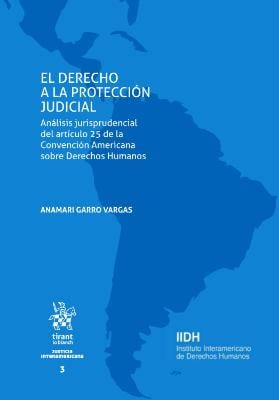
|
The Oxford Handbook of Comparative Foreign Relations Law
This book ambitiously seeks to lay the groundwork for a new field of study and teaching known as “comparative foreign relations law.” Comparative foreign relations law compares and contrasts how nations, and also supranational entities such as the European Union, structure their decisions about matters such as entering into and exiting from international agreements, engaging with international institutions, and using military force, as well as how they incorporate treaties and customary international law into their domestic legal systems. The book consists of forty-six chapters, written by leading authors from around the world. Some of the chapters are empirically focused, others are theoretical, and still others contain in-depth case studies. In addition to being an invaluable resource for scholars working in this area, the book should be of interest to lawyers, judges, and law students. Foreign relations law issues are addressed regularly by lawyers working in foreign ministries, and globalization has meant that domestic judges, too, increasingly are confronted by them. In addition, private lawyers who work on matters that extend beyond their home countries often are required to navigate issues of foreign relations law.
|

|
The Oxford Handbook of Criminal Process
This handbook examines various aspects of the criminal process, including the role of prosecutors in common law and civil law jurisdictions, the rights and duties of experts, victim rights in civil law jurisdictions, surveillance and investigation, criminal prosecution and its alternatives, evidence discovery and disclosure in common law systems, evidence law as forensic science, common law plea bargaining, appeals and post-conviction review, and procedure in international tribunals. The book is organized into eight parts covering topics ranging from criminal process in the dual penal state to interrogation law and practice in common law jurisdictions, empirical and comparative approaches to criminal procedure, prosecution-led investigations and measures of procedural coercion in the field of corruption, international corporate prosecutions, special procedures for white-collar and corporate wrongdoing in Europe, and trial procedure in response to terrorism. Also discussed are the roles of the European Convention on Human Rights and the European Court of Human Rights as guardians of fair criminal proceedings in Europe, double jeopardy or ne bis in idem in common law and civil law jurisdictions, plea bargaining vs. abbreviated trial procedures, restorative justice as an alternative to penal sanctions, and the pluralistic nature of international criminal procedure.
|
|

|
El Derecho a la protección judicial: análisis jurisprudencial del artículo 25 de la Convención Americana sobre Derechos Humanos
El Instituto Interamericano de Derechos Humanos (IIDH) se complace en apoyar la publicación de la obra “El Derecho a la protección judicial. Análisis jurisprudencial del artículo 25 de la Convención Americana sobre Derechos Humanos” de la Dra. Anamari Garro Vargas. Para el IIDH la calidad académica de la obra es evidente, no sólo por la excelencia metodológica del estudio, sino también por el análisis que desemboca en conclusiones fuertes y críticas. La lectura de esta publicación permite retomar, desde el primer ejercicio de la Corte Interamericana de Derechos Humanos (Corte IDH), la interpretación que el Tribunal ha hecho del contenido del artículo 25 de la Convención Americana y su aplicación. Lo anterior, más que un repaso, ha sido un ejercicio fascinante de analizar la muy amplia jurisprudencia de la Corte a este respecto, identificando los distintos debates y vertientes que se han suscitado y la muy controvertida relación entre el artículo 25 y el 8 del Pacto de San José.
|
|
|
The Oxford Handbook of Freedom of Speech
This book discusses freedom of speech, which is central to the liberal democratic tradition. Freedom of speech touches on every aspect of our social and political system and receives explicit and implicit protection in every modern democratic constitution. Moreover, it is frequently referred to in public discourse and has inspired a wealth of legal and philosophical literature. The book provides a critical analysis of the foundations, rationales, and ideas that underpin freedom of speech as a political idea, and as a principle of positive constitutional law. In doing so, it examines freedom of speech in a variety of national and supranational settings from an international perspective.
|
|
|
New opinions ex Protocol No. 16 to the ECHR and the Inter-American advisory practice: some comparative remarks
The analysis of the disciplines of European and Inter-American consultative procedures has already been addressed by the doctrine, particularly in light of the growing cooperation between the two regional systems. However, the first advisory opinions ex Protocol No. 16 to ECHR bring new concrete elements for understanding the European consultative procedure’s functioning and for comparative studies. The paper confronts the vast Inter-American jurisprudence and the more recent European practice specifically concerning advisory request’ subject-matter and form of the advisory opinions (stylus curiae), aiming to establish whether formal differences between the two regional systems correspond to actual divergences in the practical working, and to shed light on the consultative mechanisms’ role in both regions.
|
|
|
Hacia la reformulación de los nuevos derechos constitucionales de los sujetos excluídos, la experiencia en el derecho colombiano
La crisis sociopolitica y la construcción de la nacionalidad en el derecho colombiano, ha traducido en el nuevo milenio la aparición de nuevas tendencias, algunas muy peculiares y otras ligadas con los movimientos jurídicos que sacuden el continente. Toda ello aupado por la violencia política, guerrillera y paramilitar, la negociación del conflicto, asi como por la inserción del modelo constitucional diseñado por los constituyentes de 1991, cuando introdujeron entre otros, en el ordenamiento colombiano, un instrumento de tutela judicial efectivo, tan sencillo, cercano a la ciudadanía, importante y dinámico, al punto de que cualquier intento para modificarlo, reformarlo o adecuarlo, resulta hoy, vano, impopular e imposible.
|
|
|
|
|